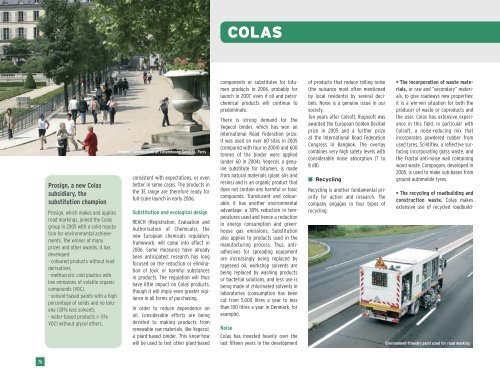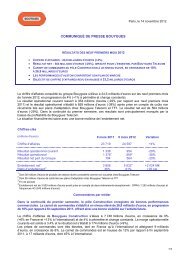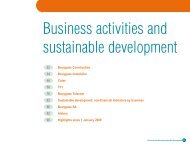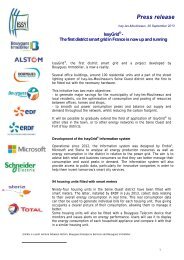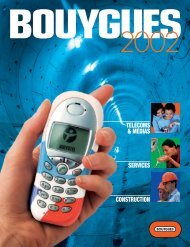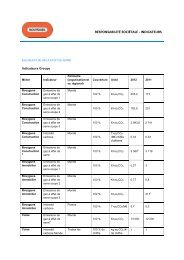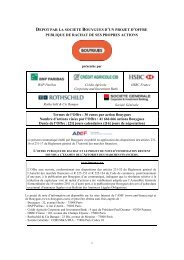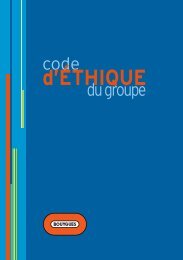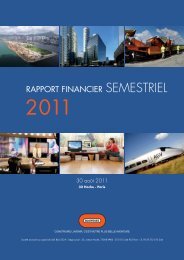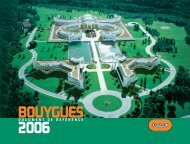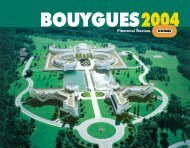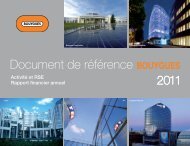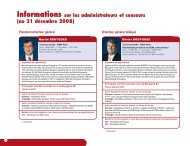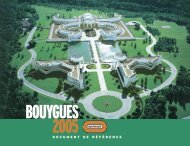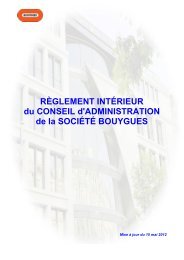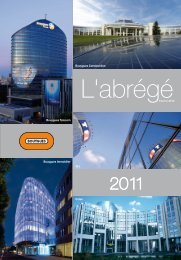A N N U A L R E P O R T - Bouygues
A N N U A L R E P O R T - Bouygues
A N N U A L R E P O R T - Bouygues
You also want an ePaper? Increase the reach of your titles
YUMPU automatically turns print PDFs into web optimized ePapers that Google loves.
COLAS<br />
Prosign, a new Colas<br />
subsidiary, the<br />
substitution champion<br />
Prosign, which makes and applies<br />
road markings, joined the Colas<br />
group in 2005 with a solid reputation<br />
for environmental achievements.<br />
The winner of many<br />
prizes and other awards, it has<br />
developed:<br />
- coloured products without lead<br />
derivatives,<br />
- methacrylic cold plastics with<br />
low emissions of volatile organic<br />
compounds (VOC),<br />
- solvent-based paints with a high<br />
percentage of solids and no toluene<br />
(30% less solvent),<br />
- water-based products (< 5%<br />
VOC) without glycol ethers.<br />
Vegecol overlay used at Luxembourg Gardens, Paris<br />
consistent with expectations, or even<br />
better in some cases. The products in<br />
the 3E range are therefore ready for<br />
full-scale launch in early 2006.<br />
Substitution and ecological design<br />
REACH (Registration, Evaluation and<br />
Authorisation of Chemicals), the<br />
new European chemicals regulatory<br />
framework, will come into effect in<br />
2006. Some measures have already<br />
been anticipated: research has long<br />
focused on the reduction or elimination<br />
of toxic or harmful substances<br />
in products. The regulation will thus<br />
have little impact on Colas products,<br />
though it will imply even greater vigilance<br />
in all forms of purchasing.<br />
In order to reduce dependence on<br />
oil, considerable efforts are being<br />
devoted to making products from<br />
renewable raw materials, like Vegecol,<br />
a plant-based binder. This know-how<br />
will be used to test other plant-based<br />
components or substitutes for bitumen<br />
products in 2006, probably for<br />
launch in 2007, even if oil and petrochemical<br />
products will continue to<br />
predominate.<br />
There is strong demand for the<br />
Vegecol binder, which has won an<br />
International Road Federation prize:<br />
it was used on over 60 sites in 2005<br />
(compared with four in 2004) and 600<br />
tonnes of the binder were applied<br />
(under 60 in 2004). Vegecol, a genuine<br />
substitute for bitumen, is made<br />
from natural materials (plant oils and<br />
resins) and is an organic product that<br />
does not contain any harmful or toxic<br />
compounds. Translucent and colourable,<br />
it has another environmental<br />
advantage: a 30% reduction in temperatures<br />
used and hence a reduction<br />
in energy consumption and greenhouse<br />
gas emissions. Substitution<br />
also applies to products used in the<br />
manufacturing process. Thus, antiadhesives<br />
for spreading equipment<br />
are increasingly being replaced by<br />
rapeseed oil, workshop solvents are<br />
being replaced by washing products<br />
or bacterial solutions, and less use is<br />
being made of chlorinated solvents in<br />
laboratories (consumption has been<br />
cut from 5,000 litres a year to less<br />
than 100 litres a year in Denmark, for<br />
example).<br />
Noise<br />
Colas has invested heavily over the<br />
last fifteen years in the development<br />
of products that reduce rolling noise<br />
(the nuisance most often mentioned<br />
by local residents) by several decibels.<br />
Noise is a genuine issue in our<br />
society.<br />
Ten years after Colsoft, Rugosoft was<br />
awarded the European Golden Decibel<br />
prize in 2005 and a further prize<br />
at the International Road Federation<br />
Congress in Bangkok. The overlay<br />
combines very high safety levels with<br />
considerable noise absorption (7 to<br />
8 dB).<br />
■ Recycling<br />
Recycling is another fundamental priority<br />
for action and research. The<br />
company engages in four types of<br />
recycling:<br />
• The incorporation of waste materials,<br />
or raw and “secondary” materials,<br />
to give roadways new properties:<br />
it is a win-win situation for both the<br />
producer of waste or coproducts and<br />
the user. Colas has extensive experience<br />
in this field, in particular with<br />
Colsoft, a noise-reducing mix that<br />
incorporates powdered rubber from<br />
used tyres, Scintiflex, a reflective surfacing<br />
incorporating glass waste, and<br />
the Fractal anti-noise wall containing<br />
wood waste. Compogom, developed in<br />
2005, is used to make sub-bases from<br />
ground automobile tyres.<br />
• The recycling of roadbuilding and<br />
construction waste. Colas makes<br />
extensive use of recycled roadbuild-<br />
Environment-friendly paint used for road marking<br />
70


